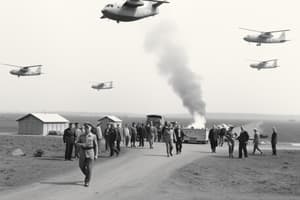Podcast
Questions and Answers
Who were evacuated during the 'First Wave' of evacuations?
Who were evacuated during the 'First Wave' of evacuations?
- Working adults
- School aged children (correct)
- Elderly people
- Teenagers
What happened during the 'phoney war'?
What happened during the 'phoney war'?
- The Blitz intensified
- Evacuation became compulsory
- No bombing occurred (correct)
- Families were reunited
How were the evacuations organized?
How were the evacuations organized?
- Teachers, volunteers, and education authorities usually organized the evacuation (correct)
- Evacuation was not organized
- The government solely organized the evacuation
- Military personnel organized the evacuation
What was the role of the Women’s Voluntary Service during evacuations?
What was the role of the Women’s Voluntary Service during evacuations?
How were billeting officers involved in the evacuation process?
How were billeting officers involved in the evacuation process?
What did families in the countryside with a spare room have to do during the evacuation?
What did families in the countryside with a spare room have to do during the evacuation?
What was a challenge for many host families when looking after evacuated children?
What was a challenge for many host families when looking after evacuated children?
What did older girls and boys offer as an advantage for host families?
What did older girls and boys offer as an advantage for host families?
Why were siblings often split up when being chosen by host families?
Why were siblings often split up when being chosen by host families?
What was the purpose of sending a postcard home with their billet address on for evacuated children?
What was the purpose of sending a postcard home with their billet address on for evacuated children?
Flashcards are hidden until you start studying
Study Notes
The 'First Wave' of Evacuations
- Urban children, mothers with infants, and the infirm were evacuated during the 'First Wave' of evacuations.
The 'Phoney War'
- The 'phoney war' referred to the period between September 1939 and May 1940 when there was little military action.
Organization of Evacuations
- Evacuations were organized by the government, with assistance from local authorities and voluntary organizations.
- Evacuees were labeled and grouped according to their destination.
Role of the Women's Voluntary Service
- The Women's Voluntary Service played a crucial role in evacuations, helping to settle evacuees in their new homes.
Billeting Officers
- Billeting officers were responsible for finding and allocating homes for evacuees.
- They worked closely with local authorities to identify suitable accommodations.
Family Involvement
- Families in the countryside with a spare room were required to take in evacuees.
- They were expected to provide food, shelter, and care for the evacuees.
Challenges for Host Families
- A challenge for many host families was adjusting to the presence of evacuees with different cultural and socio-economic backgrounds.
- Older girls and boys offered an advantage for host families as they could assist with household chores.
Sibling Separation
- Siblings were often split up when being chosen by host families due to the limited availability of accommodations.
Postcards Home
- Evacuated children were sent to send a postcard home with their billet address on to inform their families of their new location.
Studying That Suits You
Use AI to generate personalized quizzes and flashcards to suit your learning preferences.




